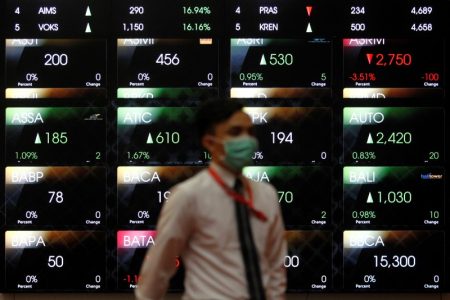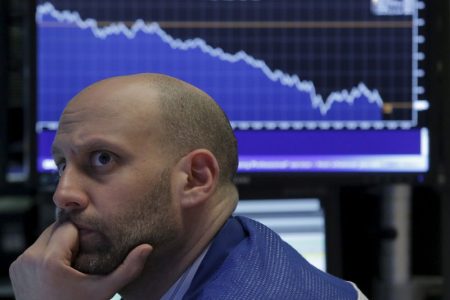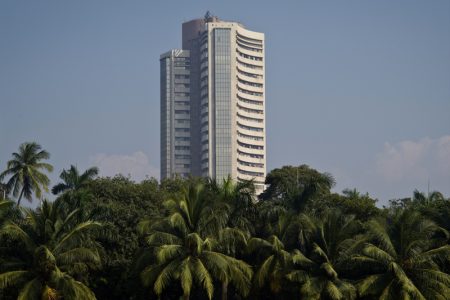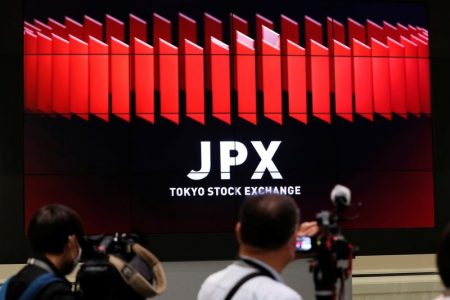By Wayne Cole
SYDNEY (Reuters) – Asia stocks hit 27-month highs on Thursday as softer U.S. data narrowed the odds on a September rate cut there, boosting bonds and commodities while dragging on the dollar.
A holiday in the United States made for thin trading, as investors waited to see just how large a majority the Labour Party might get in the UK election.
Markets are well prepared for a change given opinion polls have for months put the centre-left party on course for a landslide victory over the Conservatives.
“The Labour party has relatively modest tax and spending plans, with the overall goal of shrinking the UK’s large budget deficit,” CBA analysts said.
“The Labour government’s policies will also move the UK back towards closer alignment to the EU.”
Across the English Channel, polls suggested the National Rally (RN) would not win a majority of seats in Sunday’s French election as mainstream parties moved to block the far right.
nudged up 0.1%, while sterling firmed to $1.2750. EUROSTOXX 50 futures were little changed.
MSCI’s broadest index of Asia-Pacific shares outside Japan added 0.7% to its highest since April 2022.
rose 0.4% and was within spitting distance of its March peak, while the broader clinched all-time highs.
and Nasdaq futures were steady after reaching another record overnight in the wake of soft economic data. [.N]
The U.S. ISM measure of services activity surprised by sliding to its lowest since mid-2020, with employment notably weak ahead of the June payrolls report due on Friday.
Analysts cautioned the series was contradicted by strength in the PMI survey of services, but did note that price measures in both surveys pointed to easing inflation.
SURPRISE, SURPRISE
A run of subdued data mean Citi’s U.S. economic surprise index has sunk to -47.5, the lowest since August 2022. Meanwhile, the closely watched Atlanta Fed’s GDPNow estimate fell to just 1.5% from 1.7%.
That should be music to the ears of the Federal Reserve, with minutes of its last meeting showing committee members wanted more evidence of a cooling economy before cutting rates.
At the time of that meeting, the GDPNow growth estimate was running around 3% annualised.
“Reading through the minutes from only three weeks ago, it is a good reminder of how quickly the activity outlook has deteriorated,” said Paul Ashworth, chief North America economist at Capital Economics.
“Given the more encouraging personal consumption expenditure data in May, the risk of a reacceleration in inflation seems even less likely, particularly with GDP growth now running well below its potential,” he added. “We still think that the Fed will begin to cut interest rates this September.”
Markets quickly lifted the probability of a September rate cut to 74%, from 65%, while pricing in 47 basis points of easing for this year.
Yields on 10-year Treasuries dropped 8 basis points in response to 4.355%.
With the U.S. economy now seemingly less exceptional, the dollar dropped across the board. The euro was up at $1.0793, and away from its recent low of $1.0666, while the hit its lowest in three weeks. [USD/]
The Australian dollar was a notable gainer, touching a six-month peak of $0.6733 as markets are wagering the next move in local rates could be higher.
The yen remained out in the cold, hitting multi-year lows on a host of currencies as investors continued to favour carry trades. The dollar stood at 161.40 yen after striking a 38-year top of 161.96 overnight.
The drop in the dollar was a boon for commodities, with gold rallying to $2,358 an ounce, from $2,318 at the start of the week. [GOL/]
Oil prices eased a touch, having gained overnight when a surprisingly large decline in stocks pointed to firmer demand as the U.S. driving season gets underway. [O/R]
dipped 31 cents to $87.03 a barrel, while U.S. crude fell 33 cents to $83.55 per barrel.
Read the full article here











